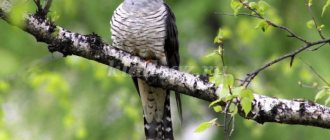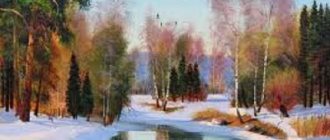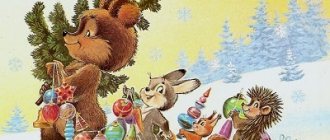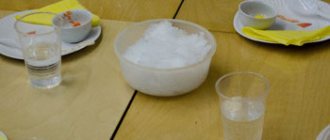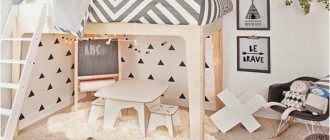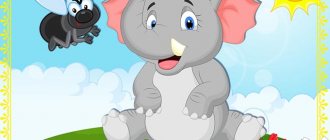Abstract of GCD in the senior group on the topic “Spring, signs of spring. Migratory birds"
Summary of the direct educational activities of children in the senior group on the topic “Spring, signs of spring.
Migratory birds" Goal : Activation of vocabulary on the lexical topic "Spring, signs of spring. Migratory birds" Educational objectives : To consolidate children's knowledge about spring, spring signs, migratory and wintering birds; the ability of children to answer a question with a complete answer, coordinating all parts of speech in a sentence. Developmental tasks : Develop basic skills of sound-syllable analysis; the ability to coordinate adjectives with nouns in gender and number, nouns with verbs, fine motor skills and tactile sensitivity. Develop logical thinking, practice ordinal and direct counting, increasing and decreasing numbers by one. Develop the ability to group birds according to different characteristics, consolidate spatial relationships. Educational objectives: To cultivate the desire and respect of children to listen to the answers of their comrades and, if necessary, be able to correct or supplement the answer. Equipment: illustrations on the topics “spring, signs of spring, birds, balls of different sizes and made of different materials, a basin with “drops” - decorative glass stones, a box, a phonogram “Birdsong”, an envelope with a letter, a package. Preliminary work: Reading fiction, memorizing poems, calls about spring, observing nature, looking at illustrations. Introductory part: Goal: focus children's attention on a problem situation and activate the desire to complete the task together to achieve a common goal. -Children, we have guests today, say hello to them! Hello children! It was no coincidence that our conversation began with this word. Saying “hello” according to custom, we wish each other health, goodness, and prosperity. I draw attention to the letter on the window - Someone threw us at the window. Look at the letter. Maybe it's a ray of sunshine that tickles our faces. Or this little sparrow dropped it while flying. Or is this a letter from a cat, like he lured a mouse to the window! - Guys! We received a letter from residents of a fabulous city. And it is called “the city of beautiful speech.” They ask for help and rely only on us. Due to the long “Winter”, the city becomes colorless and may disappear completely. Only “Spring” can help misfortune, because... with her arrival, all nature comes to life and the city becomes colorful. But for some reason she is delayed. We rely on your ingenuity and ingenuity (the letter shows a city, not decorated) - Well, guys, let's help the residents of the fairy-tale city? It will be difficult to cope with a real WINTER, but we will definitely overcome a fairy tale one, because... We are brave, dexterous, skillful guys. We help each other, And we don’t abandon our friends in trouble. Main part: - Guys, in the old days “Vesna” was called by nicknames. These are small poems with which people asked spring to come. In my grandmother’s magic box, there is also such a chant (the children pronounce it together with the teacher): Drops jump loudly from the roof. The icicles are crying above the window. The drops are jumping into my palm. And grandma's cat. The “Question and Answer” game is played using a rubber ball. Goal: Improving grammatical structure (formation of cognate words) - Tell me, what phenomenon in nature is this poem talking about? (drops); — What jumped from the roof in the poem I read? (drops); - What can you call a small drop? (drop); — If drops are dripping, what are they? (dripping); - Let's repeat together the words of one family, starting with the word DRIP, DROP, DROP, DRIP, DRIP. - Well done! You did an excellent job with this task. Breathing exercises “Veterok” - Guys! Who remembers which months on the calendar are reserved for SPRING? (March, April, May) - What month is it now? (March) - What is the weather like outside? (Cold) - What kind of wind blows in the spring? (warm, spring, cold, gentle, etc.) - Let us also depict a spring breeze. “Let’s blow a warm, barely audible breeze onto your palm.” And now a strong, cool wind blew. Let's blow on our palm. So that a strong wind can be heard (inhale through the nose. Exhale through the mouth. Don’t puff out your cheeks, 3 times) - Well done! Our palms are frozen from the cold wind, let's warm them up, play the game "Spring" Finger game "Spring" Spring has come on the snowy, On the wet carpet (we bend one finger on each hand) Scattered snowdrops (three palms against each other) Sowed grass (move apart and move the fingers) Now calling from all sides (bend your arms at the elbows, fingers open) Geese, swifts and storks Cuckoos and starlings (we bend one finger on each hand) The game “Signs of Spring” is played using a fabric ball. Goal: Clarification and expansion of knowledge about spring and its signs. — What other signs of spring do you know? — the sky became high and blue. — the sun shines brightly and warms. — in the sun the snow begins to melt. — the first thawed patches appeared around the trees. - the nights have become shorter and the days longer. — cheerful streams ran. -We exchanged heavy winter clothes for light spring ones. - all nature wakes up from its winter sleep. — migratory birds arrive from the south. — birds build nests and hatch chicks. - Well done, your answers make me happy. The game “Droplets or divide into syllables” is played using glass decorative stones. Goal: Improving the skill of syllabic analysis of words. Development of fine motor skills and tactile sensitivity. -Guys, while we were playing ball, look how many drops dripped into our basin. Place your hands in the basin and find items associated with spring. Children find one item in the basin. And the names of objects are divided into syllables. (Icicle, sun, snowdrop, starling, tree, drop, cloud, stream, ant, etc.) We will now drive We will pronounce out loud The word must be repeated And divided into syllables - To continue completing tasks, and now I suggest playing the game “ Vesnyanka" Sunshine, sunshine Golden bottom Burn, burn clearly So as not to go out (they walk in a circle) A stream ran in the garden (they run in a circle) A hundred rooks have flown in (they fly in a circle) And the snowdrifts are melting, melting (slowly crouching) And the flowers are growing (stretching) on tiptoes, hands up) The musical accompaniment “Birdsong” sounds. Children are invited to sit on the carpet and listen. - What do you hear? (birds singing) - How to call in one word the birds that spent the winter with us? — How to call birds that return from warm countries in one word? Game “Choose” Goal: to clarify and expand knowledge about wintering and migratory birds. Children choose a bird for themselves and name it. - There are two circles on the tables - blue and green - Blue circle - wintering birds - Green circle - migratory birds. - Well done! And you coped with this task perfectly! Game “Count the Birds” - In front of you is a whole street with houses. Review and answer the questions. -Who lives in these houses? What groups can they be divided into (wintering and migratory) - Who are the swallow’s neighbors? -Who lives to the left of the crossbill? -Who lives to the right of the crossbill? - Carefully consider the house numbers, which numbers are neighbors of the number 2 (1 and 3) - What number comes before the number 5 (4) - What number comes after the number 7 (8) - Between 5 and 7? - What number is less than 5 by 1 (4) - Well done! Final part. -There is a knock on the door and a box and a letter from the residents of the fairy-tale city are brought into the group. Look guys, our efforts were not in vain. In the city of “Beautiful Speech” the magical “SPRING” has come (I show the back of the letter with a colored image of the city). It awakened the city from its winter sleep, everything around came to life and became bright and colorful. - Here are gifts for you guys! Chupa - chups for you! You guys are great, you've gone through all the obstacles, get some lollipops! And say goodbye to your guests. Get ready for a walk! Result: - Guys, you completed all the tasks with an A plus. Tell me, what was our journey like? — What do you remember most from our trip? — What helped us overcome this path and withstand all the tests? Now congratulate the guests on the upcoming holiday of March 8 (children give gifts made with their own hands)
We recommend watching:
Scenario of spring entertainment in the senior group Conversation on the topic: Spring for children with special needs in the senior group Scenario of a folk spring holiday for the senior preparatory group of kindergarten Summary of educational activities for the formation of a holistic picture of the world with children of the senior group
Similar articles:
Reading competition in the spring in kindergarten. Senior – preparatory group
Entertainment dramatization on the theme: Spring in kindergarten. Middle - senior group. Scenario
Scenario of the spring game program for children of the senior group in kindergarten
Spring relay race in the senior group
Spring theatrical entertainment for older children in kindergarten
Summary of an educational lesson in the senior group on the topic: Birds in spring
Lesson in the senior group on the topic: Spring
Author: Irina Filippovna Yumshanova, teacher at the Savinsky Kindergarten, Savino village, Perm Territory, Karagay district. Description of the material: I offer you a summary of a lesson for children of the older group (5-6 years old) on the topic “Birds in Spring.” This material will be useful to teachers of the senior group. This NNOD outline aims to promote children's cognitive development.
Goal: To promote the cognitive development of children Objectives: 1) Expand knowledge about the life activities of migratory birds; 2) Teach the ability to write a short story about birds; 3) Foster a caring, caring attitude towards birds; 4) Develop imagination; Progress of the lesson Educator: Guys, today I suggest you find yourself in the spring forest and listen to the sounds of the spring forest. What did you hear? Children: The birds sing, cheerfully... Educator: Of course, the birds sing their songs cheerfully and loudly. Birds appeared on the street that were not there in winter; where did so many birds come from? Children: from warm countries, from the south. Educator: This is the main miracle of spring - it is in spring that our feathered friends fly to us, bringing spring on their wings. What do children call the birds that fly back to us in the spring? Children: migratory. Educator: pay attention to the miracle - a tree, but no birds are visible on it. I suggest you sing a call to call the birds. The call is “Little birds, little birds, come to us, a clear spring, a red spring, bring us.” At this time, migratory birds appeared on the tree. Educator: What birds did you recognize? Children: nightingale, starling, swallow, rook Teacher: also cuckoo, oriole, lark. Guess the riddle about one of these birds: “Flew to us with warmth Having traveled a long way Sculpts a house under the window From grass and clay” Who is this riddle about? Children: Swallow Educator: Look, the swallow has black wings, head, back, white breast, small, sharp nose. The tail is like two pigtails. Guess the following riddle: “Anyone will recognize his trills, He sings other people’s songs, An amazing singer Our beloved by all...” Children: starling Educator: Look what the starling looks like: it is black, its beak is sharp, its breast is speckled with white. And here is the beautiful oriole, she has yellow plumage, her wings and the tip of her tail are black. Children, together with the teacher, examine and compare other birds. Educator: What do birds make us happy about? Children: songs, beauty Educator: Yes, birds delight us with their plumage, wonderful colors, their singing, what do you guys think the birds sing about in the spring? Children: they are probably happy that they have returned home. Educator: Of course, they are glad that they returned to their homeland, they sing about what wonderful countries they have seen, about how difficult their path home was, they are glad to meet you. I suggest you now play the game “Magic Transformations” (We turn into a migratory bird and make up a short story about this bird) Guys, what will happen if the birds do not return to us in the spring? Children: we will be sad without them, there will be no one to sing songs. Educator: There will be no one to protect parks, gardens, forests from harmful insects. Insects will eat all the vegetation and destroy the harvest of vegetables and fruits. There will be no one to distribute the seeds of berries, herbs, and flowers. We won't hear their songs. Therefore, we must protect the birds and help them. The teacher reads the poem “So that the blooming gardens do not die in vain from harmful insects Always at any time of the year Take care of the birds, friends.”
In the spring, birds have a lot of worries, they build nests and hatch chicks.
Do you know what birds build nests from? Children: from grass, branches, leaves. The teacher shows pictures of various nests and talks about them.
1. A swallow makes a nest under the ridge of the roof, crushes clay with its nose, bathes it in the river, carries it with its nose.
2. The song thrush’s nest is simply a sight to behold, the outside is decorated with green moss, the inside is smooth like a cup: made of wood dust with saliva. 3. The remez bird collects fluff from a willow tree, makes a nest for itself, it is downy, soft, like a mitten, it hoists it over the water, on a young reed. 4. The nightjar bird does not build nests, it makes a hole between hummocks and hatches eggs in the hole, in the hole-nest there are three beautiful marble eggs, first two chicks hatched, how many have not hatched yet? 5. The oriole’s nest looks like a basket; she makes it in trees high from the ground, in a branch of thin branches. 6. And the nightingale settles in the bird cherry thickets, making a nest right on the ground. A physical education lesson is being held : “The cranes have flown in. They went to dance. Extend their legs. Smoothly flap their wings.” Educator: Guys, look, another bird has flown to our miracle tree. “A white-sided magpie flew to us from afar, didn’t say where it was, brought you interesting facts.” The teacher reads out the facts:
1. Did you know that the starling is a master of imitating the voices of different birds.
2. There are birds that love to talk. 3. Storks knock with one half of their beak. 4. Snipes - rapidly descending, spread the feathers on their tail and wings, and the air, passing through them, hums. Educator: Guys, what other concern do birds have? Children: lay eggs, hatch chicks Educator: otherwise he takes care, incubates, warms, protects eggs Children: mother is a bird Educator: female, and who feeds mother? Children: dad is a male bird Educator: and now I suggest you put a bird out of the “magic square” game and tell what kind of bird it is and where it builds its nest, what interesting things you remember about the bird. The children lay out the birds, the teacher approaches each one and asks what kind of bird it is. Teacher: Well done guys, you turned out to be beautiful birds, I think you will be good friends for the birds.
We recommend watching:
Lego technology in the system of additional education in preschool educational institutions Drawing on the theme of Spring in 1st grade step by step Abstract of educational activities on speech development in the senior group Monitoring of older children on cognitive-speech and artistic-aesthetic development
Similar articles:
Abstract of the GCD in the senior group for the implementation of the educational field "Communication" on the topic "Journey through the fairy tale Spikelet"
Spring games for children in kindergarten. Senior preparatory group
Spring birthday party in kindergarten. Senior group
Round dance game on the theme “Spring” in the senior group
Integrated entertainment for the senior group in the spring
